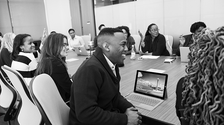Most languages have special expressions, commonly used phrases, or set phrases, that are widely used in reaction to specific situations. Set phrases are phrases that people have been using for a long period of time -- and moreover the usage of these phrases is rooted in the native speaker’s culture, traditions, special features, and the language itself.
In this article, you will learn about German set phrases for real life situations. How exactly do Germans react when somebody is sneezes or what do they say if somebody is trying to ski or snowboard for the first time? To sound like a native German speaker, you should learn to use set phrases in appropriate situations.
So let’s have a look to different situations and to the reaction in German.
Below are fictional situations in the life of Sabine, who lives in Germany, and you can see how people and Sabine interact with each other.
Sabine hat morgen die Deutschprüfung. Die Mutter sagt:
Sabine has a German exam tomorrow. The mother said:
- Ich drücke dir die Daumen! - I'll keep my fingers crossed.
- Viel Glück! - Good luck!
- Toi, toi, toi!
*Toi, toi, toi! – this saying is based on a counter-charm against the envy of evil spirits. Today it is usually interpreted as a congratulatory fashion in the sense of "You may succeed".
Zum Glück hat Sabine die Prüfung bestanden. Man kann sagen:
Fortunately, Sabine has passed the exam. You can say:
- Herzlichen Glückwunsch! - Congratulations!
Sabine hat auch heute Geburtstag. Alle sagen:
Sabine’s birthday is today. Everybody said:
- Alles Gute zum Geburtstag! - Happy birthday!
- Zum Geburtstag viel Glück! – Happy birthday to you!
Mit ihrer Familie geht Sabine jetzt ins Restaurant. Sie haben Wein bestellt und jetzt trinken sie. Sie sagen zusammen:
Sabine goes with her family to a restaurant. They ordered wine and now they’re drinking. Sabine and her family said:
- Zum Wohl! - Cheers!
Aber die Männer haben das Bier bestellt und sie sagen:
But the men ordered beer and they say:
- Prost! – Cheers!
Sie beginnen mit dem Essen. Und man sagt:
They start eating. They can say:
- Guten Appetit! Gleichfalls! - Enjoy your meal! The same to you!
Die Gäste fahren mit dem Auto nach Hause und Sabine sagt:
The guests go home by car and Sabine said:
- Komm gut nach Hause! - Get home safely (take care!)
Aber plötzlich ist Sabine am nächsten Tag krank geworden. Alle sagen:
But suddenly Sabine was ill the next day. Everybody said:
- Gute Besserung! - Get well soon!
Sie hat eine Erkältung. Sie niest den ganzen Tag.
She caught a cold. She is sneezing the whole day.
- Gesundheit! - Bless you!
Sabine ist jetzt gesund!
Now Sabine is healthy.
- Gott sei Dank! – Thanks God!
Sabine fährt in den Urlaub!
Sabine is going on holiday!
- Gute Fahrt! - Enjoy your trip!
- Gute Reise! - Have a good trip!
Außerdem ist sie eine begeisterte Skifahrerin. Sie fährt in die Schweiz in den Skiurlaub! Man sagt:
She is also an enthusiastic skier. She travels to Switzerland for skiing! You can say:
- Hals-und Beinbruch! - Break a leg!
*Hals-und Beinbruch! - This expression is old and was used in German hunting tradition to say "I hope you don't break your neck or your leg”. Now it’s used (in both German and English) as a wish to someone to pass a test or difficult task.
Sie ist nun im Hotel und die Rezeptionistin sagt:
She is now in a hotel and the receptionist said:
- Guten Aufenthalt in der Schweiz! – Good stay in Switzerland!
Der Bruder von Sabine Marcus ruft an und sagt, er spielt in einer Fußballmannschaft und hat morgen ein wichtiges Spiel mit sehr starker Mannschaft. Sabine sagt ihm:
Sabine’s brother Marcus calls and tell her that he plays in a football team and has an important match with a very strong team tomorrow. Sabine tells him:
- Lass euch nicht unterkriegen! – “Don’t let them beat you!”
- But literally it means: Chin up! Keep your tail up!
Sabine sagt dem Bruder: Es tut mir sehr leid, dass ich dein Spiel verpasse. Marcus sagt:
Sabine tells the brother: I'm very sorry I missed your game. Marcus said:
- Kein Problem! - No problem!
oder
- Keine Sorgen! - No worries!
oder
- Mach dir keinen Kopf!
Wann kommst du nach Deutschland zurück? – fragt Marcus. Und Sabine sagt:
When are you coming back to Germany? - asks Marcus. And Sabine said:
- Ich habe keine Ahnung! – I have no idea!
Sabine ist endlich zurück nach Deutschland gekommen. Es ist der 25.12. Ihre Eltern kommen zum Essen und sie sagen:
Sabine finally returned to Germany. It’s December 25th. Her parents arrived for dinner and they said:
- Frohes Fest! – Happy Holidays!
- Frohe Weinachten! – Merry Christmas!
Marcus ist auch da und er sagt, dass seine Mannschaft das Spiel verloren hat. Sabine sagt:
Marcus is also there and he says his team lost the game. Sabine said:
- So ein Pech! – What a pity!
Es ist der 31.12. Sabine trifft Ihre Nachbarin im Treppenhaus und sie sagen:
It’s December 31st. Sabine meets her neighbour at the stairwell and they both said to each other:
- Einen guten Rutsch! – Happy New Year!
The word "rutschen" is a verb "to slide or to slip" - so when you hear this, people wish that you pleasantly slide into the New Year. There is an explanation that this expression is an adoption from the Yiddish phrase, which sounds like Rosch ha schono and means “a good start to the year”.
Es ist der 2.1. Sie geht zur Arbeit und sieht dort Ihre Kollegen. Sie sagen:
It’s January 2nd. She goes to work and sees her colleagues there. They all say:
- Glückliches Neues Jahr! – Happy New Year!
Die Kollegin Helga sagt: Hast du gehört, dass der Chef und die Sekretärin heiraten werden? Sabine sagt:
Her colleague Helga says: Did you hear the boss and the secretary got married? Sabine said:
- So ein Quatsch! – Nonsense!
- Das ist mir egal! - I don’t care!
Sabine ist von der Arbeit nach Hause gekommen, sie ist müde und geht sofort schlafen. Marcus sagt:
Sabine arrived home from work, she is tired and immediately goes to sleep. Marcus said:
- Gute Nacht! – Good night!
- Schlaf gut! – Sleep well!
If you want to sound like German, learn these phrases and practice them for each of their appropriate situations. If by chance you reside in Germany, then you are very lucky, as you can practice these phrases daily because they are quite popular.
Viel Spaß und viel Erfolg beim Deutschlernen!
Hero image by Taylor Grote on Unsplash








